An official website of the United States government
 United States Department of Labor
United States Department of Labor
Help extraction craft workers, such as earth drillers, blasters and explosives workers, derrick operators, and mining machine operators, by performing duties requiring less skill. Duties include supplying equipment or cleaning work area. Apprentice workers are classified with the appropriate skilled construction trade occupation (47-2011 through 47-2231).
Employment estimate and mean wage estimates for Helpers--Extraction Workers:
| Employment (1) | Employment RSE (3) |
Mean hourly wage |
Mean annual wage (2) |
Wage RSE (3) |
|---|---|---|---|---|
| 12,740 | 6.1 % | $ 18.82 | $ 39,150 | 1.2 % |
Percentile wage estimates for Helpers--Extraction Workers:
| Percentile | 10% | 25% | 50% (Median) |
75% | 90% |
|---|---|---|---|---|---|
| Hourly Wage | $ 12.65 | $ 14.90 | $ 18.20 | $ 22.67 | $ 26.79 |
| Annual Wage (2) | $ 26,300 | $ 30,990 | $ 37,860 | $ 47,160 | $ 55,730 |
Industries with the highest published employment and wages for Helpers--Extraction Workers are provided. For a list of all industries with employment in Helpers--Extraction Workers, see the Create Customized Tables function.
Industries with the highest levels of employment in Helpers--Extraction Workers:
| Industry | Employment (1) | Percent of industry employment | Hourly mean wage | Annual mean wage (2) |
|---|---|---|---|---|
| Support Activities for Mining | 6,850 | 2.52 | $ 18.74 | $ 38,970 |
| Utility System Construction | 2,850 | 0.51 | $ 18.32 | $ 38,110 |
| Coal Mining | 660 | 1.53 | $ 23.31 | $ 48,480 |
| Other Specialty Trade Contractors | 550 | 0.08 | $ 16.87 | $ 35,090 |
| Nonmetallic Mineral Mining and Quarrying | 380 | 0.39 | $ 19.74 | $ 41,050 |
Industries with the highest concentration of employment in Helpers--Extraction Workers:
| Industry | Employment (1) | Percent of industry employment | Hourly mean wage | Annual mean wage (2) |
|---|---|---|---|---|
| Support Activities for Mining | 6,850 | 2.52 | $ 18.74 | $ 38,970 |
| Coal Mining | 660 | 1.53 | $ 23.31 | $ 48,480 |
| Metal Ore Mining | 280 | 0.70 | $ 20.65 | $ 42,950 |
| Utility System Construction | 2,850 | 0.51 | $ 18.32 | $ 38,110 |
| Nonmetallic Mineral Mining and Quarrying | 380 | 0.39 | $ 19.74 | $ 41,050 |
Top paying industries for Helpers--Extraction Workers:
| Industry | Employment (1) | Percent of industry employment | Hourly mean wage | Annual mean wage (2) |
|---|---|---|---|---|
| Coal Mining | 660 | 1.53 | $ 23.31 | $ 48,480 |
| Metal Ore Mining | 280 | 0.70 | $ 20.65 | $ 42,950 |
| Management, Scientific, and Technical Consulting Services | 30 | (7) | $ 19.99 | $ 41,570 |
| Nonmetallic Mineral Mining and Quarrying | 380 | 0.39 | $ 19.74 | $ 41,050 |
| Support Activities for Mining | 6,850 | 2.52 | $ 18.74 | $ 38,970 |
States and areas with the highest published employment, location quotients, and wages for Helpers--Extraction Workers are provided. For a list of all areas with employment in Helpers--Extraction Workers, see the Create Customized Tables function.
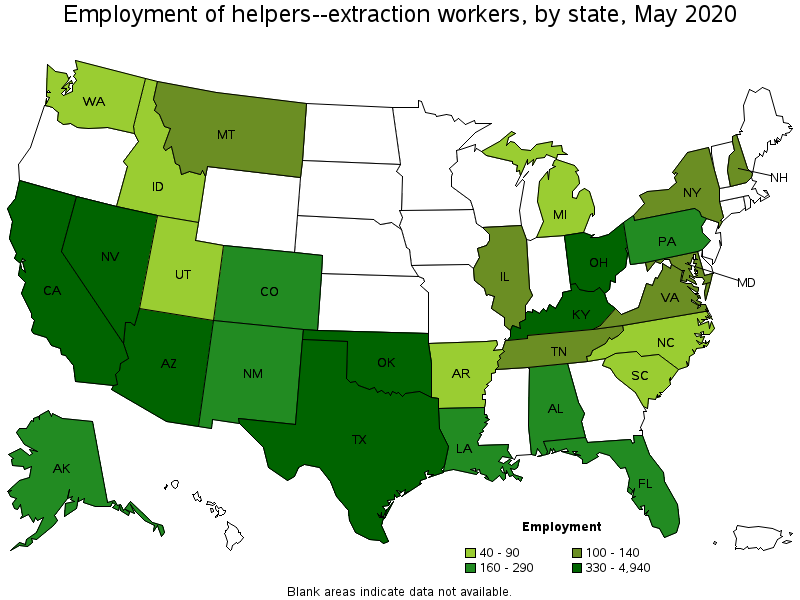
States with the highest employment level in Helpers--Extraction Workers:
| State | Employment (1) | Employment per thousand jobs | Location quotient (9) | Hourly mean wage | Annual mean wage (2) |
|---|---|---|---|---|---|
| Texas | 4,940 | 0.41 | 4.46 | $ 17.33 | $ 36,040 |
| California | 830 | 0.05 | 0.55 | $ 22.62 | $ 47,040 |
| Arizona | 760 | 0.27 | 2.92 | $ 19.82 | $ 41,230 |
| Nevada | 680 | 0.54 | 5.94 | $ 19.09 | $ 39,710 |
| Kentucky | 460 | 0.26 | 2.81 | $ 19.03 | $ 39,580 |
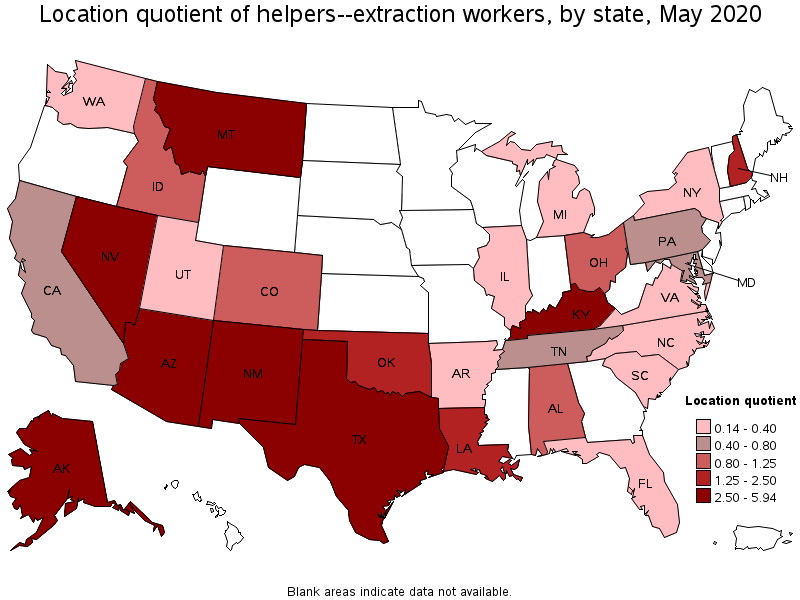
States with the highest concentration of jobs and location quotients in Helpers--Extraction Workers:
| State | Employment (1) | Employment per thousand jobs | Location quotient (9) | Hourly mean wage | Annual mean wage (2) |
|---|---|---|---|---|---|
| Nevada | 680 | 0.54 | 5.94 | $ 19.09 | $ 39,710 |
| Alaska | 160 | 0.53 | 5.78 | $ 23.40 | $ 48,680 |
| Texas | 4,940 | 0.41 | 4.46 | $ 17.33 | $ 36,040 |
| Montana | 130 | 0.28 | 3.06 | $ 17.11 | $ 35,590 |
| Arizona | 760 | 0.27 | 2.92 | $ 19.82 | $ 41,230 |
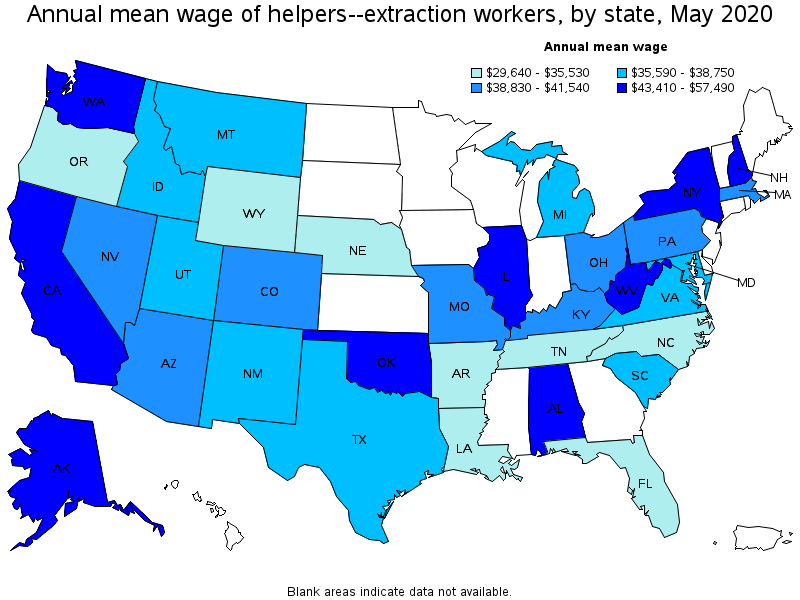
Top paying states for Helpers--Extraction Workers:
| State | Employment (1) | Employment per thousand jobs | Location quotient (9) | Hourly mean wage | Annual mean wage (2) |
|---|---|---|---|---|---|
| Alabama | 210 | 0.11 | 1.20 | $ 27.64 | $ 57,490 |
| Alaska | 160 | 0.53 | 5.78 | $ 23.40 | $ 48,680 |
| California | 830 | 0.05 | 0.55 | $ 22.62 | $ 47,040 |
| West Virginia | (8) | (8) | (8) | $ 21.85 | $ 45,450 |
| Illinois | 100 | 0.02 | 0.19 | $ 21.77 | $ 45,280 |
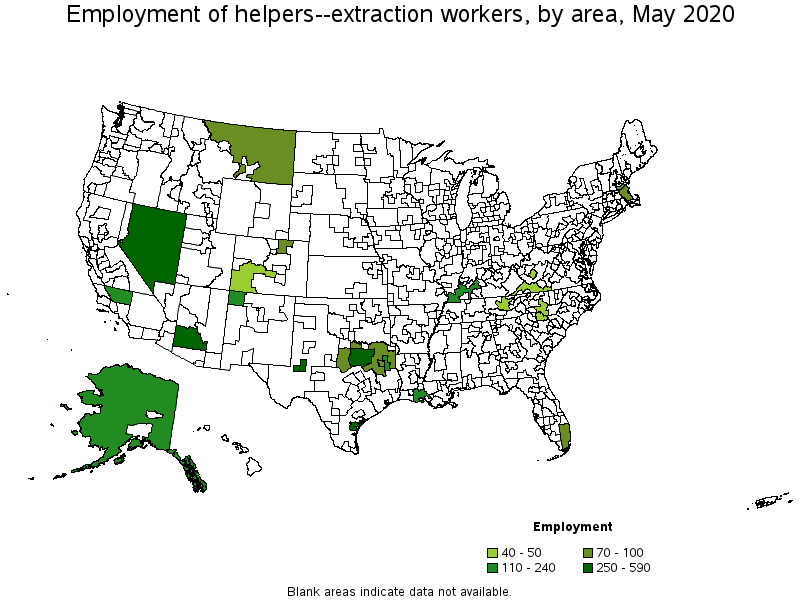
Metropolitan areas with the highest employment level in Helpers--Extraction Workers:
| Metropolitan area | Employment (1) | Employment per thousand jobs | Location quotient (9) | Hourly mean wage | Annual mean wage (2) |
|---|---|---|---|---|---|
| Phoenix-Mesa-Scottsdale, AZ | 500 | 0.24 | 2.59 | $ 20.36 | $ 42,350 |
| Dallas-Fort Worth-Arlington, TX | 450 | 0.12 | 1.36 | $ 15.84 | $ 32,950 |
| Midland, TX | 330 | 3.28 | 35.84 | $ 18.20 | $ 37,850 |
| Odessa, TX | 320 | 4.37 | 47.72 | $ 19.54 | $ 40,650 |
| Corpus Christi, TX | 250 | 1.36 | 14.84 | $ 16.59 | $ 34,500 |
| Bakersfield, CA | 240 | 0.80 | 8.73 | $ 24.11 | $ 50,150 |
| Lafayette, LA | 190 | 0.98 | 10.73 | $ 15.90 | $ 33,070 |
| Longview, TX | 140 | 1.49 | 16.28 | $ 17.93 | $ 37,300 |
| Farmington, NM | 110 | 2.60 | 28.41 | $ 18.77 | $ 39,050 |
| Tyler, TX | 100 | 1.06 | 11.63 | $ 21.22 | $ 44,130 |
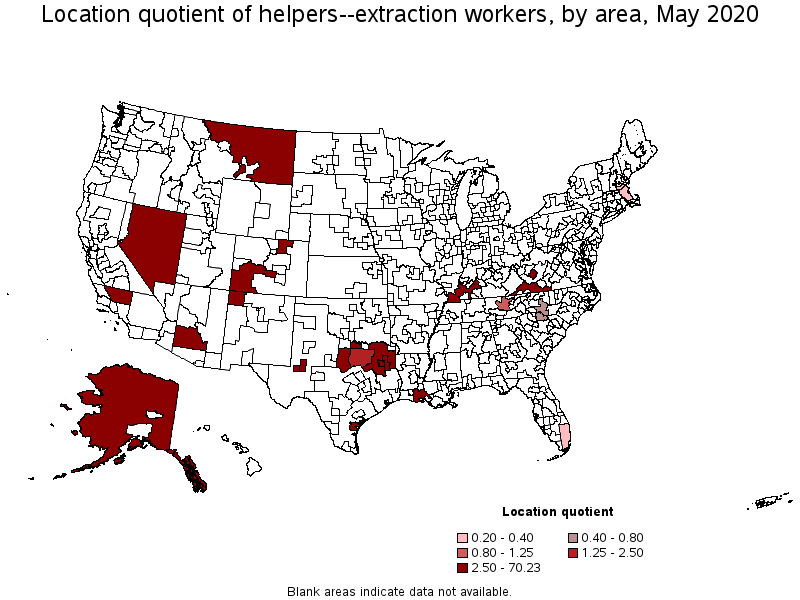
Metropolitan areas with the highest concentration of jobs and location quotients in Helpers--Extraction Workers:
| Metropolitan area | Employment (1) | Employment per thousand jobs | Location quotient (9) | Hourly mean wage | Annual mean wage (2) |
|---|---|---|---|---|---|
| Odessa, TX | 320 | 4.37 | 47.72 | $ 19.54 | $ 40,650 |
| Midland, TX | 330 | 3.28 | 35.84 | $ 18.20 | $ 37,850 |
| Farmington, NM | 110 | 2.60 | 28.41 | $ 18.77 | $ 39,050 |
| Longview, TX | 140 | 1.49 | 16.28 | $ 17.93 | $ 37,300 |
| Corpus Christi, TX | 250 | 1.36 | 14.84 | $ 16.59 | $ 34,500 |
| Tyler, TX | 100 | 1.06 | 11.63 | $ 21.22 | $ 44,130 |
| Lafayette, LA | 190 | 0.98 | 10.73 | $ 15.90 | $ 33,070 |
| Greeley, CO | 100 | 0.98 | 10.69 | $ 17.49 | $ 36,370 |
| Beckley, WV | 40 | 0.98 | 10.68 | $ 19.17 | $ 39,870 |
| Bakersfield, CA | 240 | 0.80 | 8.73 | $ 24.11 | $ 50,150 |
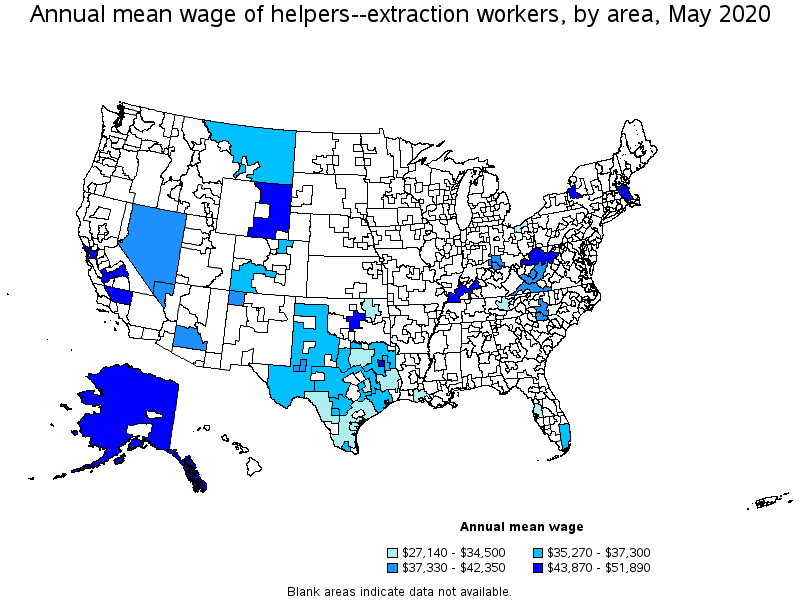
Top paying metropolitan areas for Helpers--Extraction Workers:
| Metropolitan area | Employment (1) | Employment per thousand jobs | Location quotient (9) | Hourly mean wage | Annual mean wage (2) |
|---|---|---|---|---|---|
| Oklahoma City, OK | (8) | (8) | (8) | $ 24.95 | $ 51,890 |
| Bakersfield, CA | 240 | 0.80 | 8.73 | $ 24.11 | $ 50,150 |
| San Francisco-Oakland-Hayward, CA | (8) | (8) | (8) | $ 23.22 | $ 48,290 |
| Boston-Cambridge-Nashua, MA-NH | 90 | 0.03 | 0.37 | $ 22.04 | $ 45,850 |
| Tyler, TX | 100 | 1.06 | 11.63 | $ 21.22 | $ 44,130 |
| Syracuse, NY | (8) | (8) | (8) | $ 21.11 | $ 43,900 |
| Fresno, CA | (8) | (8) | (8) | $ 21.09 | $ 43,870 |
| Phoenix-Mesa-Scottsdale, AZ | 500 | 0.24 | 2.59 | $ 20.36 | $ 42,350 |
| Charlotte-Concord-Gastonia, NC-SC | 50 | 0.04 | 0.47 | $ 19.94 | $ 41,480 |
| Odessa, TX | 320 | 4.37 | 47.72 | $ 19.54 | $ 40,650 |
Nonmetropolitan areas with the highest employment in Helpers--Extraction Workers:
| Nonmetropolitan area | Employment (1) | Employment per thousand jobs | Location quotient (9) | Hourly mean wage | Annual mean wage (2) |
|---|---|---|---|---|---|
| Nevada nonmetropolitan area | 590 | 6.43 | 70.23 | $ 19.26 | $ 40,070 |
| West Kentucky nonmetropolitan area | 200 | 1.43 | 15.58 | $ 23.32 | $ 48,510 |
| Alaska nonmetropolitan area | 140 | 1.43 | 15.58 | $ 23.20 | $ 48,250 |
| East-Central Montana nonmetropolitan area | 80 | 1.32 | 14.39 | $ 17.54 | $ 36,480 |
| North Texas Region of Texas nonmetropolitan area | 70 | 0.25 | 2.70 | $ 16.96 | $ 35,270 |
Nonmetropolitan areas with the highest concentration of jobs and location quotients in Helpers--Extraction Workers:
| Nonmetropolitan area | Employment (1) | Employment per thousand jobs | Location quotient (9) | Hourly mean wage | Annual mean wage (2) |
|---|---|---|---|---|---|
| Nevada nonmetropolitan area | 590 | 6.43 | 70.23 | $ 19.26 | $ 40,070 |
| Alaska nonmetropolitan area | 140 | 1.43 | 15.58 | $ 23.20 | $ 48,250 |
| West Kentucky nonmetropolitan area | 200 | 1.43 | 15.58 | $ 23.32 | $ 48,510 |
| East-Central Montana nonmetropolitan area | 80 | 1.32 | 14.39 | $ 17.54 | $ 36,480 |
| Southwest Colorado nonmetropolitan area | 40 | 0.41 | 4.52 | $ 17.74 | $ 36,900 |
Top paying nonmetropolitan areas for Helpers--Extraction Workers:
| Nonmetropolitan area | Employment (1) | Employment per thousand jobs | Location quotient (9) | Hourly mean wage | Annual mean wage (2) |
|---|---|---|---|---|---|
| West Kentucky nonmetropolitan area | 200 | 1.43 | 15.58 | $ 23.32 | $ 48,510 |
| Northern West Virginia nonmetropolitan area | (8) | (8) | (8) | $ 23.22 | $ 48,300 |
| Alaska nonmetropolitan area | 140 | 1.43 | 15.58 | $ 23.20 | $ 48,250 |
| Eastern Wyoming nonmetropolitan area | (8) | (8) | (8) | $ 22.65 | $ 47,120 |
| Southern West Virginia nonmetropolitan area | (8) | (8) | (8) | $ 19.82 | $ 41,240 |
These estimates are calculated with data collected from employers in all industry sectors, all metropolitan and nonmetropolitan areas, and all states and the District of Columbia. The top employment and wage figures are provided above. The complete list is available in the downloadable XLS files.
The percentile wage estimate is the value of a wage below which a certain percent of workers fall. The median wage is the 50th percentile wage estimate—50 percent of workers earn less than the median and 50 percent of workers earn more than the median. More about percentile wages.
(1) Estimates for detailed occupations do not sum to the totals because the totals include occupations not shown separately. Estimates do not include self-employed workers.
(2) Annual wages have been calculated by multiplying the hourly mean wage by a "year-round, full-time" hours figure of 2,080 hours; for those occupations where there is not an hourly wage published, the annual wage has been directly calculated from the reported survey data.
(3) The relative standard error (RSE) is a measure of the reliability of a survey statistic. The smaller the relative standard error, the more precise the estimate.
(7) The value is less than .005 percent of industry employment.
(8) Estimate not released.
(9) The location quotient is the ratio of the area concentration of occupational employment to the national average concentration. A location quotient greater than one indicates the occupation has a higher share of employment than average, and a location quotient less than one indicates the occupation is less prevalent in the area than average.
Other OEWS estimates and related information:
May 2020 National Occupational Employment and Wage Estimates
May 2020 State Occupational Employment and Wage Estimates
May 2020 Metropolitan and Nonmetropolitan Area Occupational Employment and Wage Estimates
May 2020 National Industry-Specific Occupational Employment and Wage Estimates
Last Modified Date: March 31, 2021